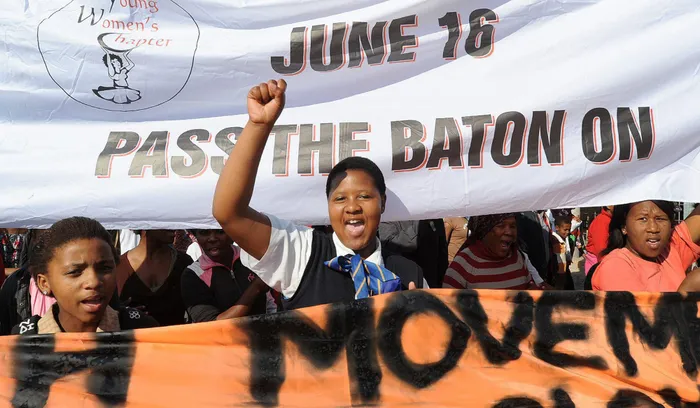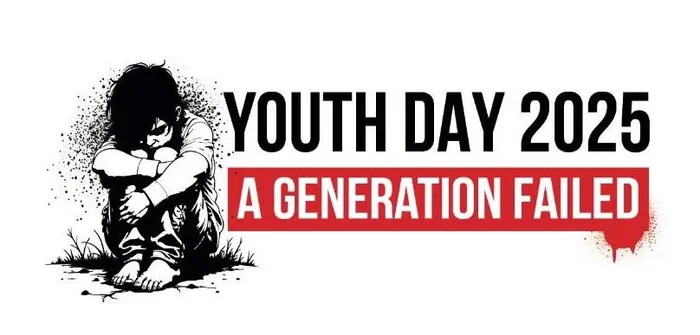Honouring Youth Day: The Legacy of June 16 in South Africa
Opinion

In 1976, the bravery of tens of thousands of school children ignited a countrywide rebellion, setting in motion a transformation that would define the future.
Image: Neil Baynes/Independent Newspapers
THIS year’s Youth Day commemorates 49 years since the June 16 student uprisings (also known as the Soweto Massacres), a crucial turning point in the liberation struggle of South Africa.
In 1976, the bravery of tens of thousands of school children ignited a countrywide rebellion, setting in motion a transformation that would define the future. The killing of hundreds of these vulnerable children left an indelible mark on the country’s collective memory, a painful reminder of both devastation and the powerful legacy forged by South African youth.
“Youth is a time of revolt, and we owe much of progress to the discontent of youth.” This was spoken by our former President Nelson Mandela, who advocated for the role of youth in driving social change. The youth of June 16 are a significant example of how young people can drive political and legislative changes that shaped our Constitution.
With the recent passing of the African Literary Giant, Professor Ngugi wa Thiong’o, the realities of language as a tool of oppression in education have been revealed. Although we are over three decades into our post-democratic society, the legacy of apartheid still grips our society.

The youth of 2025 are facing several challenges, from high employent rates to substance abuse.
Image: File
Recently, President Cyril Ramaphosa announced a National Dialogue for South African citizens to address issues like gender-based violence, unemployment, hunger, land, corruption, and violence. This dialogue is an opportunity for all South Africans to engage with pressing issues that affect their daily lives.
While participatory processes that centre community voices are invaluable, the government has long hosted elite roundtables recycling broken promises. Dialogue without action is not progress; it’s deflection.
For decades, youth, particularly in higher education, have battled to decolonise education and the curriculum. This process, linked to the philosophy of Ubuntu, entails acknowledging the legitimacy of African languages and embracing indigenous knowledge systems.
Language remains the elephant in the room across institutional reforms in education. The challenges of the youth of June 16 are eerily similar to those faced by the youth of #FeesMustFall and students nationwide.
For many South Africans, language is both a bridge and a barrier. Despite the recognition of 11 official languages, the dominance of Afrikaans and English marginalises those who speak indigenous languages. This linguistic inequality severely reinforces class, racial, and educational divides, making it difficult for millions to access healthcare, education, justice, and economic opportunities.
It is ironic that decades after liberation, children are still taught in colonial languages foreign to their homes. The late Prof Ngugi wa Thiong’o argued that this is a form of mental enslavement. Language is not just communication; it carries culture, dignity, and identity.
The state’s failure to invest in indigenous languages is a quiet violence that erases identities, disempowers communities, and deepens exclusion. This compounds the challenges faced by youth.
June 16, Youth Day, is not only a commemoration of the slain youth of the Soweto Massacre and the undeniable impact that their legacy has left in our nation, but it is also about earnestly responding to the realities and challenges of today’s youth. From institutional biases to rampant unemployment, young people grapple with many issues.
These challenges are worsened by vulnerabilities faced by youth, especially females. According to MHI Attorneys, 115 women are raped each day, and three women are killed daily by intimate partners, with gun violence rates skyrocketing. The statistics are alarming and highlight the urgent need for effective intervention.
Although the government has implemented policies to tackle gender-based violence and femicide, they have been nonchalant about stifling their prevalence. Recently, we have seen the brutalisation of innocents like Wits student Olorato Mongale and others.
From the youngest child to the most formidable adult, youth are not sufficiently protected or valued. Protecting society is a collective responsibility that ensures children are safe in their homes, streets, and schools. As Frederick Douglass said: “It is easier to build strong children than to repair broken men.”
South Africa’s youth are not just the leaders of tomorrow; they are powerful change-makers today. They are shaping a society that is more tolerant, creative, equitable, and inclusive. Their energy and innovation drive advancement across all sectors, from technology to the arts.
Young people are reimagining education to be more accessible and relevant, launching businesses that tackle meaningfully unemployment and inequality, whilst bolstering our economy. They are pioneering smart, sustainable solutions for our environmental challenges. They are standing on the frontlines of activism, raising their voices against discrimination, advocating for human rights, and holding the powerful to account.
The youth of today are the engines of progress — collaborating, overcoming, embracing creativity and innovation, all while adapting and thriving amid challenges. Supporting them is essential; they are key drivers of societal evolution and positioned at the heart of our nation's development.
When we see young activists, we should recognise them as exemplifying the spirit of the 1976 youth of South Africa. The fire that burned in the hearts of the June 16 generation still burns today. Young people are often the first to demand a just and free future.
Steve Biko’s message: “The most potent weapon in the hands of the oppressor is the mind of the oppressed,” continues to resonate with today’s youth. They challenge structures that tell them they are less and refuse to remain silent.
The history of youth in South Africa is distinguished. To honour June 16 is to remember their sacrifice and fuel the revolution they began. Today’s youth do not inherit a legacy but continue a revolution. As Winnie Madikizela-Mandela said: “The power of the people is greater than the people in power.”
* Tswelopele Makoe is a gender and social justice activist and the editor at Global South Media Network (GSMN). She is a researcher and columnist, and an Andrew W Mellon scholar at the Desmond Tutu Centre for Religion and Social Justice, UWC. The views expressed are her own.
** The views expressed here do not reflect those of the Sunday Independent, IOL, or Independent Media.
Related Topics: